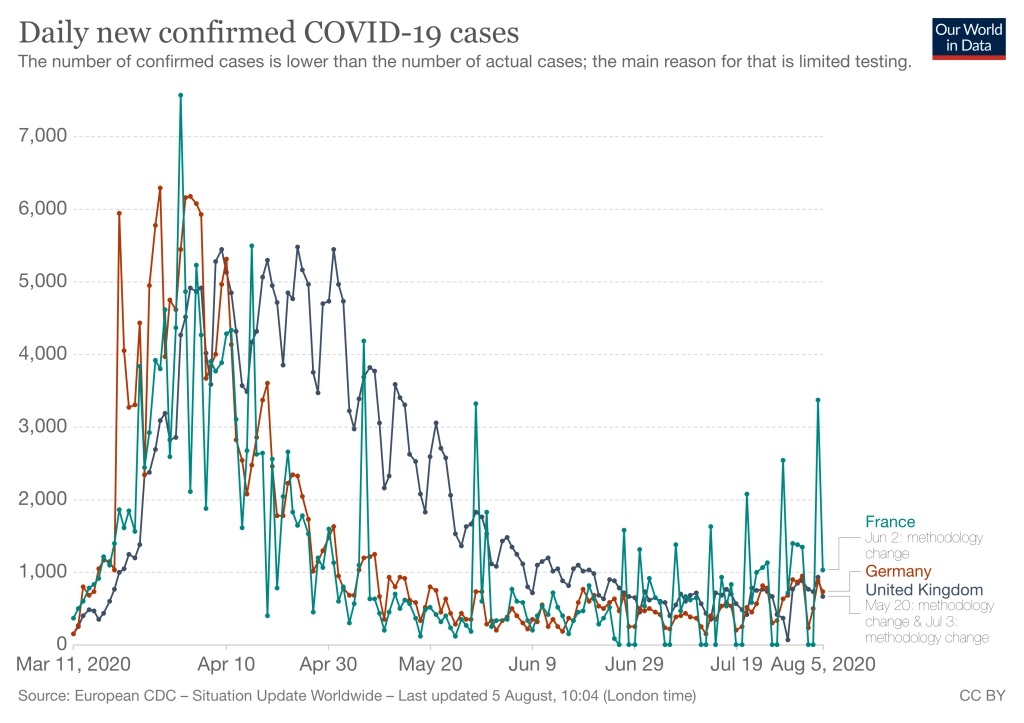英国在疫情初期取消边境管制,被指责是“严重错误”
英国议员在一份言辞激烈的跨党派报告中指责政府在3月份新冠疫情愈演愈烈的时候,在边境控制问题上犹豫不决,结果导致成千上万人被感染。英国政府对这些指责做出了反击。
英国在六月初才开始执行严格的边境管制措施,要求所有人入境时必须自我隔离两周,违者将面临罚款。这比其他许多国家已经晚了接近三个月。许多国家早已开始执行边境管制,要求入境人员隔离或至少接受健康检查。
2月份和3月初疫情爆发之初,英国曾经对从中国、伊朗和意大利入境的旅客执行过一些管制措施,但在3月13日却突然取消了边境管制。英国的疫情远比其他欧洲国家严重,目前英国因新冠肺炎造成的死亡人数超过4.6万人,确诊病例为30.6万例。
鲍里斯·约翰逊政府为什么会在三月中旬做出那个重大的决定呢?英国议会内政事务委员会(Home Affairs Committee)也想知道这个问题的答案,并在周三公布了它的结论。
内政事务委员会在周三的声明中表示:“委员会无法找到任何科学证据,证明这个莫名奇妙的决定是合理的,在三月中旬没有执行任何专门的边境管制措施是严重错误。”
该委员会在附带的报告中写道:“如果尽早采取严格的措施,比如要求入境人员强制隔离等,有可能会抑制病毒的传播速度。尤其是没有建议从西班牙入境或回国人员自我隔离14天……或者至少监控症状和拨打[国家医疗服务热线],是一个错误。”
负责边境管制的英国内政部很快对此予以反驳。
内政部称:“内政事务特别委员会的论述是错误的。我们在疫情期间的所有决策都以科学为依据,都是在正确的时间采取的恰当措施,都是为了保护全体国民的安全。”
“当英国感染水平较低时,随着旅客数量大幅减少,科学建议明确显示,对外国入境人员执行隔离措施是最有效的。因此,随着英国疫情得到控制,我们在6月8日执行了边境管制措施,旨在保护公众健康,避免爆发令国家医疗服务疲于应对的第二波疫情高峰。”

事实上,许多专家指出,当病毒已经形成社区传播的时候,关闭边境对控制疫情的效果有限。他们认为在这种情况下,病毒检测、治疗和接触者跟踪才是重点。
但内政事务委员会在报告中否定了内政部关于旅客数量的说法。
报告称:“虽然旅客数量开始下降,但从3月13日到3月23日执行封锁措施,依旧有100万人入境,截至4月中旬可能又增加了数十万人。这其中可能有数千人已经感染了新冠肺炎。”
内政部反驳称,其并没有在3月13日撤销隔离指导意见,只是该指导意见被“全国居家隔离指导意见取代。”
内政部回应内政事务委员会的报告称:“委员会已经做出了解释,这意味着任何人进入英国境内,只要出现症状,必须与其他国民一样自我隔离。”
问题是英国在3月23日才开始执行恰当的封锁措施。内政事务委员会称,中间间隔的十天既没有全国封锁,也没有严格的边境管制,“这是严重的错误,大幅加快了疫情在英国蔓延的速度和规模,这意味着有更多人感染了新冠肺炎。”
医学专家们似乎站在内政事务委员会一边。
卡迪夫大学(Cardiff University)医学院院长安德鲁·弗里德曼在一份声明中表示,“如果政府采取不同的措施,会减少多少感染者,”这无法确定,但“3月中旬取消了对入境旅客的自我隔离要求以及初期防疫工作的松懈,确实是导致大量输入病例的罪魁祸首,你很难否认这个结论。”
“显然英国的政策与欧洲和全世界其他许多国家的做法是截然不同的。”(财富中文网)
翻译:刘进龙
审校:汪皓
英国议员在一份言辞激烈的跨党派报告中指责政府在3月份新冠疫情愈演愈烈的时候,在边境控制问题上犹豫不决,结果导致成千上万人被感染。英国政府对这些指责做出了反击。
英国在六月初才开始执行严格的边境管制措施,要求所有人入境时必须自我隔离两周,违者将面临罚款。这比其他许多国家已经晚了接近三个月。许多国家早已开始执行边境管制,要求入境人员隔离或至少接受健康检查。
2月份和3月初疫情爆发之初,英国曾经对从中国、伊朗和意大利入境的旅客执行过一些管制措施,但在3月13日却突然取消了边境管制。英国的疫情远比其他欧洲国家严重,目前英国因新冠肺炎造成的死亡人数超过4.6万人,确诊病例为30.6万例。
鲍里斯·约翰逊政府为什么会在三月中旬做出那个重大的决定呢?英国议会内政事务委员会(Home Affairs Committee)也想知道这个问题的答案,并在周三公布了它的结论。
内政事务委员会在周三的声明中表示:“委员会无法找到任何科学证据,证明这个莫名奇妙的决定是合理的,在三月中旬没有执行任何专门的边境管制措施是严重错误。”
该委员会在附带的报告中写道:“如果尽早采取严格的措施,比如要求入境人员强制隔离等,有可能会抑制病毒的传播速度。尤其是没有建议从西班牙入境或回国人员自我隔离14天……或者至少监控症状和拨打[国家医疗服务热线],是一个错误。”
负责边境管制的英国内政部很快对此予以反驳。
内政部称:“内政事务特别委员会的论述是错误的。我们在疫情期间的所有决策都以科学为依据,都是在正确的时间采取的恰当措施,都是为了保护全体国民的安全。”
“当英国感染水平较低时,随着旅客数量大幅减少,科学建议明确显示,对外国入境人员执行隔离措施是最有效的。因此,随着英国疫情得到控制,我们在6月8日执行了边境管制措施,旨在保护公众健康,避免爆发令国家医疗服务疲于应对的第二波疫情高峰。”
事实上,许多专家指出,当病毒已经形成社区传播的时候,关闭边境对控制疫情的效果有限。他们认为在这种情况下,病毒检测、治疗和接触者跟踪才是重点。
但内政事务委员会在报告中否定了内政部关于旅客数量的说法。
报告称:“虽然旅客数量开始下降,但从3月13日到3月23日执行封锁措施,依旧有100万人入境,截至4月中旬可能又增加了数十万人。这其中可能有数千人已经感染了新冠肺炎。”
内政部反驳称,其并没有在3月13日撤销隔离指导意见,只是该指导意见被“全国居家隔离指导意见取代。”
内政部回应内政事务委员会的报告称:“委员会已经做出了解释,这意味着任何人进入英国境内,只要出现症状,必须与其他国民一样自我隔离。”
问题是英国在3月23日才开始执行恰当的封锁措施。内政事务委员会称,中间间隔的十天既没有全国封锁,也没有严格的边境管制,“这是严重的错误,大幅加快了疫情在英国蔓延的速度和规模,这意味着有更多人感染了新冠肺炎。”
医学专家们似乎站在内政事务委员会一边。
卡迪夫大学(Cardiff University)医学院院长安德鲁·弗里德曼在一份声明中表示,“如果政府采取不同的措施,会减少多少感染者,”这无法确定,但“3月中旬取消了对入境旅客的自我隔离要求以及初期防疫工作的松懈,确实是导致大量输入病例的罪魁祸首,你很难否认这个结论。”
“显然英国的政策与欧洲和全世界其他许多国家的做法是截然不同的。”(财富中文网)
翻译:刘进龙
审校:汪皓
The British government has pushed back against lawmakers who, in a damning cross-party report, accused it of dithering over border controls as the COVID-19 pandemic gathered steam in March—dooming thousands of people to infection as a result.
The U.K. only instituted strict entry controls in early June, when it started requiring everyone arriving in the country to self-isolate for two weeks or face fines. This was nearly three months after many other countries introduced controls requiring quarantine or at least health screening on arrival.
The country had imposed some controls on people arriving from China, Iran and Italy quite early in the crisis, in February and early March, but then it abruptly lifted them on March 13. The U.K. went on to be hit harder than any other European country, with a death toll that currently stands above 46,000, and a confirmed infection count of 306,000.
Why did Boris Johnson's government make that fateful mid-March decision? That's what Parliament's Home Affairs Committee wanted to know, and on Wednesday it delivered its verdict.
"The Committee was unable to find any scientific evidence to justify this inexplicable decision and says that the failure to have any special border measures in place in mid-March was a serious error," it said in a Wednesday statement.
"Had stronger early measures been taken—such as requiring legally-enforceable quarantine for arrivals—it is likely that the spread of the virus could have been slowed," the committee stated in the accompanying report. "The failure to advise people travelling or returning from Spain in particular to self-isolate for 14 days… or, at the very least, to monitor symptoms and call [the National Health Service or NHS's hotline] was a mistake."
The Home Office—the government department responsible for border controls—was quick to hit back.
"The Home Affairs Select Committee are incorrect in their assertions," the Home Office said. "All of our decisions throughout the pandemic have been guided by the science, with appropriate measures introduced at the right time to keep us all safe."
"And with passengers numbers significantly reduced, the scientific advice was clear that quarantine measures for those entering the country from abroad would be most effective when the U.K. has a lower level of infection. Therefore, as the virus was brought under control here, border measures were introduced on June 8 to protect public health and help avoid a second peak that would overwhelm the NHS."
U.K. COVID cases (dark blue line) have shown a different trajectory from that of its European neighbors. Some health experts blame the U.K.'s protracted curve on its hesitance to act in the initial weeks of the outbreak.
Indeed, many experts have pointed out that border closures have limited effect when a virus is already rampant in the community, and have argued that the focus under such circumstances should be on testing, treatment and contact-tracing.
But the committee rejected the Home Office's argument about passenger numbers in its report.
"Although passenger numbers started to fall, a further one million people were to arrive between 13 March and lockdown on 23 March, and possibly hundreds of thousands more by mid-April. That is likely to have included thousands of people with COVID-19," it said.
The Home Office countered that it had not in fact dropped isolation guidance on March 13, but rather that this guidance had been "superseded by the national stay at home guidance."
"As has been explained to the committee, this meant that anyone entering the country, like the rest of the population, was required to self-isolate if they developed symptoms," the department said in response to the report.
The problem there is that the government only introduced a proper lockdown in the U.K. on March 23. That 10-day gap—with no national lockdown and no strict border controls—"was a serious mistake that significantly increased both the pace and the scale of the epidemic in the U.K., and meant that many more people caught COVID-19," the committee wrote.
Medical experts seem to be on the committee's side.
Andrew Freedman, head of Cardiff University's School of Medicine, said in a statement that it is impossible to be "certain how many fewer infections there would have been, had things been done differently," but "it is hard to disagree with the conclusion that the removal of any requirement for arriving travelers to self-isolate in mid-March, as well as the lax arrangements earlier on, did lead to a large influx of imported cases."
"The U.K. policy was clearly at odds with those of many other countries in Europe and around the world."













